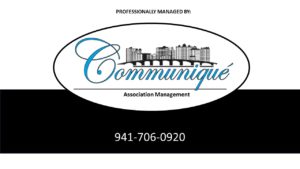Welcome to Par Four at Capri Condominium Association
CLICK HERE: PAR FOUR AT CAPRI CONDOMINIUM RESIDENT PORTAL
Resident portal for Association records and accounting ledgers – We’re here to help!
We understand the importance of communicating the association’s activities, records, and financials to owners. The Resident Portal allows owners to view their account ledger, submit work orders, view upcoming and prior meeting records, and much more. It is a great resource and tool for owners to access 24/7. The system is user-friendly and easy to sign into. However, if you should have any trouble logging in, please contact the support team to walk you through the process.
Support Contact Information for FSPay/ Resident portal:
Hours of Resident Payment Support: 8am – 8pm EST
Resident Payment Support line: (800) 690-0984 or email: residentpayments@frontsteps.com
Looking to purchase or rent at PAR FOUR AT CAPRI? Living in a community with deed restrictions offers many advantages but also comes with responsibilities. These responsibilities are not meant to be an inconvenience or impose on your freedom but rather offer a vehicle where each association can maintain a consistent lifestyle throughout the community.

Par Four at Capri Condominium Documents and Rules
PF ARTICLES OF INCORPORATION AMENDED AND RESTATED 4.17.2017
PF BYLAWS AMENDED AND RESTATED 4.17.2017
PF DECLARATION OF CONDOMINIUM AMENDED AND RESTATED 4.2017
***Owners have access to the association’s minutes, financials, and other association records through their resident portal. If you are listing a home or looking to purchase and need a copy of the records, please contact the owner or seller’s agent to provide the information to you.***
COMMONLY ASKED QUESTIONS FOR SALES AND LEASING
Please be sure to read the association Documents to fully understand the restrictions and responsibilities in place for the association.
The below is only a quick reference and guideline.
USE RESTRICTIONS
14.1 Occupancy of Units: Single Family Residence. Units shall be used only as a single family residence. The term “Single Family” is defined in Article 1.18 herein. No more than six (6) persons may at any time permanently occupy any Unit. For purposes of these Condominium Documents, “permanently occupy” means to sleep in the Unit for more than thirty (30) nights in the aggregate during any calendar year. No Unit may be divided or subdivided nor may any portion apart from the entire Unit be sold or otherwise transferred. Units may not be used for commercial or business purposes. Unit Owners (and their Tenants, Guests, Occupants and Invitees) may use Units for “home office” or “telecommuting” purposes, provided that such uses do not involve customers or clients coming onto the Condominium Property, the posting of any signage in the Condominium, the storage of equipment, products, or materials in the Condominium, nor more than two (2) regular deliveries per day of correspondence or similar items from customary express delivery services.
14.4 Signs. Unit Owners shall not post, nor permit to be posted, any sign upon the Common Elements or within or upon any Unit indicating that the Unit is for sale, rent, or available for inspection by interested parties (i.e. an “open-house’) without the prior written consent of the Board of Directors.
14.7 Pets. No farm animals, livestock or poultry of any kind shall be raised, bred or kept within or upon a Unit or any portion of the Common Elements, except that Owners are permitted to keep no more than two (2) domesticated pets of up to 25 pounds each within the Unit. Such animals may not be kept, bred or maintained for any commercial purposes and may never cause a nuisance or danger to any other Owner, Tenant, Guest or Invitee. Pets must be kept on a leash when outside of the Unit. Any pet which causes a danger to anyone’s health, safety, or welfare or becomes a nuisance may be required to be permanently removed. Owners shall be fully responsible for the actions of their pets. Exposed excrement on Units, lawns, roads, streets, or any portion of the Common Elements shall be considered a nuisance and an unreasonable annoyance hereunder. Owners and their Tenants, Guests and Invitees must comply with all local laws and ordinances pertaining to dogs and other pets. The Board of Directors may adopt rules and regulations to further restrict pets.
14.7.1 Assistance Animals: No provision of this Article 14.7 shall be interpreted in any way to impair the rights of persons with disabilities and such persons’ right to a reasonable accommodation under applicable federal and state laws.
16. LEASING. Unit Owners and Primary Occupants may lease their Unit. The terms “leasing” and “renting” shall be used interchangeably in this Declaration. The terms “Tenant” and “Lessee” shall likewise be used interchangeably. All leases must be in writing and must be a minimum of 2 consecutive months. Unit Owners and Primary Occupants wishing to lease their Unit must provide the Board of Directors (or the Board’s designee) with written notice of such intention to lease at least 30 days prior to the commencement of the proposed lease, together with the name(s) of the proposed Lessee, the names of all proposed Occupants, and such other information as the Board of Directors may reasonably require. Any person occupying the Unit after init’1al approval shall be subject to a separate application and approval process. The Board of Directors shall have thirty (30) days from the receipt of notice and all required information within which to approve or disapprove of the proposed lease, the proposed Lessees and the proposed Occupants. However, where the proposed lessee is a service member (i.e. any person serving as a member of the United States Armed Forces on active duty or state active duty and all members of the Florida National Guard and United States Reserve Forces) the Board of Directors must approve or deny the rental application within 7 days after its receipt of all required information and must notify the service member in writing of an application approval or denial and, if denied, the reason for denial. Absent a timely denial of the rental application, the Board of Directors must allow the Unit Owner to lease the Unit to the service member. The Board shall use its best efforts to provide the Unit Owner or Primary Occupant written notice of its decision within said period. No individual rooms may be rented and no transient tenants may be accommodated. “Rentsharing” and subleasing are prohibited.
16.3 Application Fee. The Board of Directors may charge an application fee in connection with a proposed lease in an amount determined by the Board not to exceed the maximum amount permitted by law.
17.2.1 Sale or Other Transfer. No Unit owner may dispose of a Unit or any interest in the same by sale or other title transfer, without prior written approval of the Board of Directors. No Unit Owner may dispose of a Unit or any interest therein by other means (including agreement for deed, installment sales contract, lease-option or other similar transactions) without prior written approval by the Board of Directors.
14.8 Vehicles and Parking. The following definitions shall apply for purposes of this Article 14.8:
A “Truck” is any motor vehicle which is designed or used principally for the carriage of goods and includes a motor vehicle to which has been added a cabinet box, a bed, a platform, a rack, or other equipment for the purpose of carrying goods other than the personal effects of the passengers, whether or not said cabinet box, bed, platform or rack has been enclosed by a cap, “topper” or other enclosure. This shall specifically include “pick-up trucks.”
A “Permitted Pick-up Truck” is any pick-up truck which does not exceed two (2) tons weight rated carrying capacity, and has no more than four (4) standard (factory) wheels, and contains factory installed standard suspension, and is used solely for personal transportation and which is not used as a commercial vehicle. Permitted pick-up trucks shall be single cab, “extended cab” or “crew cab” with a box no longer than eight feet. Permitted pick-up trucks must also be of original manufacturer’s height, width and weight in order to be considered as a “permitted pick-up truck.”
A “Commercial Vehicle” is any vehicle of any kind whatsoever (including regular passenger automobiles and permitted pick-up trucks), which, from viewing the exterior of the vehicle or any portion thereof, shows or tends to show any commercial or charitable institution(e.g. church or school) markings, signs, displays, tools, toolboxes, bins, equipment, racks, altered beds, ladders, apparatus, any vehicle with more than four (4) tires or with tires larger than the standard or optional tires offered by the vehicle manufacturer for that specific model, or otherwise indicates a commercial or other non-personal use. Any vehicle which contains exterior graphics or markings (including those which are painted or wrapped in vinyl), or bear signage, logos, phone numbers, advertising, or Internet/website addresses shall be considered commercial vehicles. Vehicles not primarily designed for family transportation (including but not limited to limousines and hearses) shall be considered commercial vehicles whether or not actually so used for the purpose for which the vehicle was originally designed. For any resident who drives an automobile issued by any governmental entity (i.e., police cars), such automobile shall not be deemed to be a commercial vehicle and may be parked in the garage or parking space assigned to the Unit.
A “Recreational Vehicle” is any vehicle other than a personal passenger automobile or permitted pick-up truck, such as a trailer, camper, motor home, boat, or boat trailer which is used primarily for travel and recreational purposes.
14.8.1 Parking. Personal passenger automobiles and other permitted vehicles shall be parked only in designated parking spaces, driveways or in the carports. Vehicles that cannot operate on their own power or which do not have a current license plate/registration, and any vehicle with exterior body damage shall not be permitted to be parked in any parking space for more than 12 hours. Motorcycles are not permitted at any time upon the Condominium Property. No truck, commercial vehicle, or recreational vehicle shall be permitted to remain upon any portion of the Condominium Property other than for temporary parking as hereafter prov’1ded. “Temporary parking” shall mean parking of such vehicles belonging to Owners or their Guests, or other vehicles such as delivery trucks, service vehicles and other commercial vehicles actively being used in the furnish’ing of services to the Association or the Unit Owners, and parking of such vehicles belonging to or being used by Owners for loading and unloading purposes only and for periods of time not to exceed four (4) hours in the aggregate during the day. The Board may adopt rules for the further regulation of such vehicles within the Condominium Property. Vehicles parked anywhere other than in a parking space, carport or a driveway shall be deemed illegally parked. Vehicle maintenance or repairing vehicles anywhere on the Condominium Property is prohibited. No vehicle shall protrude onto or in any manner block or interfere with access to the vehicular easement areas, parking areas, another parking space, sidewalk, pathway or street and any vehicle so protruding, block’1ng or interfering shall be deemed illegally parked. Any and all vehicles that are illegally parked are subject to towing by the Association at the Unit Owner’s expense without notice. This provision app1·1es to all Unit Owners, occupants, tenants and guests. Unit Owners shall be responsible for compliance with this provision by their family, tenants, quests and invitees.
PROFESSIONALLY MANAGED BY:
 Manager Contact Information
Manager Contact Information
Maureen@Communiquemgmt.com
941-706-0920

